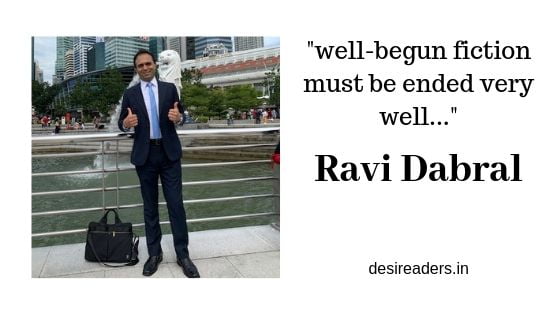Well-begun should be well-ended in fiction! Opinion
Conclusion in any fiction has an important role to play. This is the aspect of any novel that decides the magnitude of the overall impact on the readers. A strong narrative can bite the dust if an author fails to deliver a convincing conclusion that justifies the narrative and gets the central idea home. On the other hand, even a loose narrative with a strong conclusion can make the impact so strong that the concerned fiction seems more effective than it actually is. So, authors must focus on getting their conclusions right.

“To end something that you have begun becomes very important when it comes to writing fiction. You have to end it in a style that satisfies the curiosity of the readers. If you want to leave it open-ended to further add something in your next book, try leaving your readers excited and not frustrated or agitated!”
This is what Ravi Dabral says about the conclusion in fiction. One of the best crime thriller novelists in India today, Ravi Dabral has made his debut in the Indian fiction writing with his book Greed Lust Addiction and Lalach Vasana Lat, which is the Hindi translation of his original book in English. Greed Lust Addiction has a conclusion that ends all the curiosities, speculations and suspense. Moreover, Ravi Dabral has rather opted for a conclusion that is convincing and emphatic rather than going for the open-ended option.
For example, the novels like Hunger Games & El James’ erotic works series 50 Sheds leave their readers curious, excited and anticipating for something new to arrive. They end their novels but also begin a new idea with the ending. And then, there are works like Sherlock Holmes and James Bond. The reader understands by default that their heroes will be doing something new and so, they just have to wait. However, for the readers and also for the authors, the difficulty arises. When the author is new (just a debutant) or a person who has written only 2-3 novels in the past, readers are not very much familiar with the vision and writing style or the universal traits of that particular author. And therefore, it becomes inevitable for that author not to leave any room for frustration to mount on the readers. And it MUST be ended with a convincing conclusion – something that leaves no room for the readers to think anything else than the conclusion itself – and the task is extremely difficult! It has to be done, however. And we have seen the authors who have impressed the literary fraternity in the very debuts they have made. So, it can certainly be done if the author is determined to do it.
Many top book critics in India who are running some of the best book review websites in India, often argue that a piece of fiction is only taken seriously if that ends well. All the hard work that a writer does in crafting the plot and perfecting the theme must meet a convincing conclusion otherwise everything just bursts like a water bubble!
To end this piece, I will only emphasise that a well-begun might certainly be half-done but a well-ended is completion. One must achieve completion in order to create a loyal and eager fan base because literature seldom gives you second chances! So, dear authors, do write well but DO end your writings very well.
feature desk, Desi Readers
